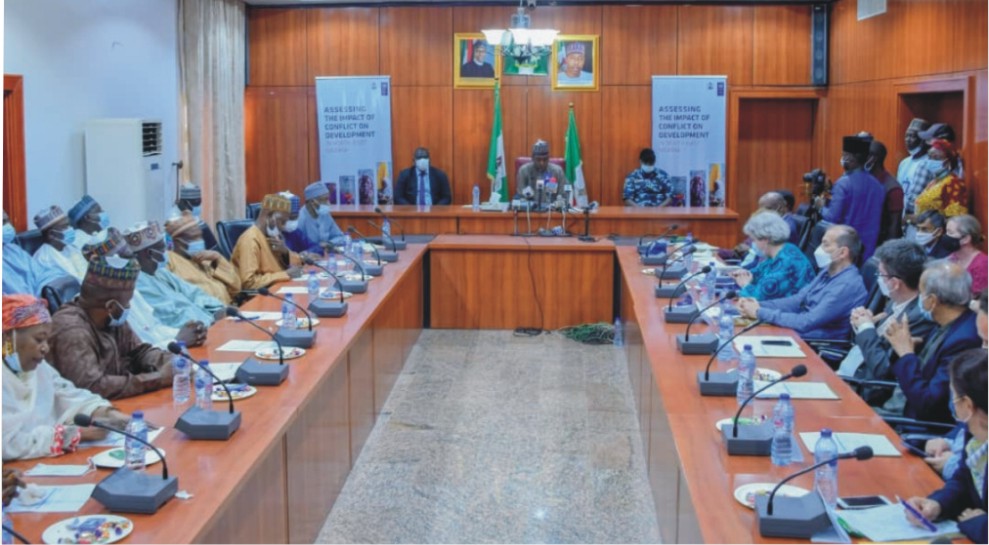Business
IMF Seeks Fiscal Adjustments, Targeted Intervention

The International Monetary Fund (IMF) has called for an aggressive monetary tightening and fiscal adjustment to restore macroeconomic stability.
It said, despite the difficult external environment and challenges on the local scene, it is confident that Nigeria is able to meet its loan obligations.
IMF, in its Post Financing Assessment (PFA) released over the weekend, whilst commending the policies embarked upon by the Federal Government and the Central Bank of Nigeria (CBN), said “Nigeria’s capacity to repay the Fund is adequate”.
Noting that Nigeria faces a difficult external environment and wide-ranging domestic challenges, the fund called for targeted support for the vulnerable in the country, saying, “the form of social transfers is needed, given the ongoing cost-of-living crisis”.
According to the IMF, external financing (market and official) is scarce, and global food prices have surged, reflecting the repercussions of conflict and geo-economic fragmentation.
“Per-capita growth in Nigeria has stalled, poverty and food insecurity are high, exacerbating the cost-of-living crisis. Low reserves and very limited fiscal space constrain the authorities’ option space.
“Against this backdrop, the authorities’ focus on restoring macroeconomic stability and creating conditions for sustained, high and inclusive growth is appropriate. The government’s focus on revenue mobilisation and digitalization would improve public service delivery and safeguard fiscal sustainability.
“The envisaged reduction in the overall deficit in 2024 would help contain debt vulnerabilities and eliminate the need for CBN financing. Temporary and targeted support to the most vulnerable in the form of social transfers is needed, given the ongoing cost-of-living crisis.
“Fuel and electricity subsidies are costly, do not reach those that most need government support and should be phased out completely.
“Staff assesses that Nigeria’s capacity to repay the Fund is adequate under the baseline. The authorities’ policy intentions are well placed to address risks of a downside scenario where difficult trade-offs may arise between urgent humanitarian needs and debt service, including to the Fund.
“In such circumstances, aggressive monetary tightening and fiscal adjustment combined with support from development partners would be needed to restore macroeconomic stability”, it noted.
In respect to the monetary policy of the country, the IMF, in its Staff Assessment said: “the CBN has set out on a welcome path of monetary tightening. The Governor has committed to making price stability the core objective of monetary policy, and the CBN has taken actions to mop up excess liquidity.
“Continuing to raise the monetary policy rate until it is positive in real terms would be an important signal of the direction of monetary policy. The authorities are exploring options to strengthen Nigeria’s reserve position, though a careful assessment of unintended consequences is needed in some cases.
“Settling the CBN’s overdue dollar obligations will help rebuild confidence in the Central Bank and the Naira. Sharing comprehensive information on Nigeria’s reserves position would facilitate a more complete assessment of the external situation”.
Business
Customs Seek Support To Curb Smuggling In Ogun

Business
IFAD: Nigeria Leads Global Push For Youth, Women Investment In Agriculture
Business
Expert Tasks FG On Food Imports To Protect Farmers

-

 Sports4 days ago
Sports4 days agoArsenal Women End Man City’s Invincibility
-

 Sports4 days ago
Sports4 days agoU-20 WWC: Falconets claim qualifier win
-

 Sports4 days ago
Sports4 days agoInsurance Deepen Enyimba’s Trouble
-

 Sports4 days ago
Sports4 days agoYouth Olympics preparation Gears up
-

 Sports4 days ago
Sports4 days agoCologne Youth Team Set Crowd Record
-

 Sports4 days ago
Sports4 days agoTornadoes Set For NPFL exit over Stadium Ban
-

 Sports4 days ago
Sports4 days agoBarca Pull Out Of Super League Project
-

 Sports4 days ago
Sports4 days agoPalmer Stars As Chelsea Compound Wolves Woes

